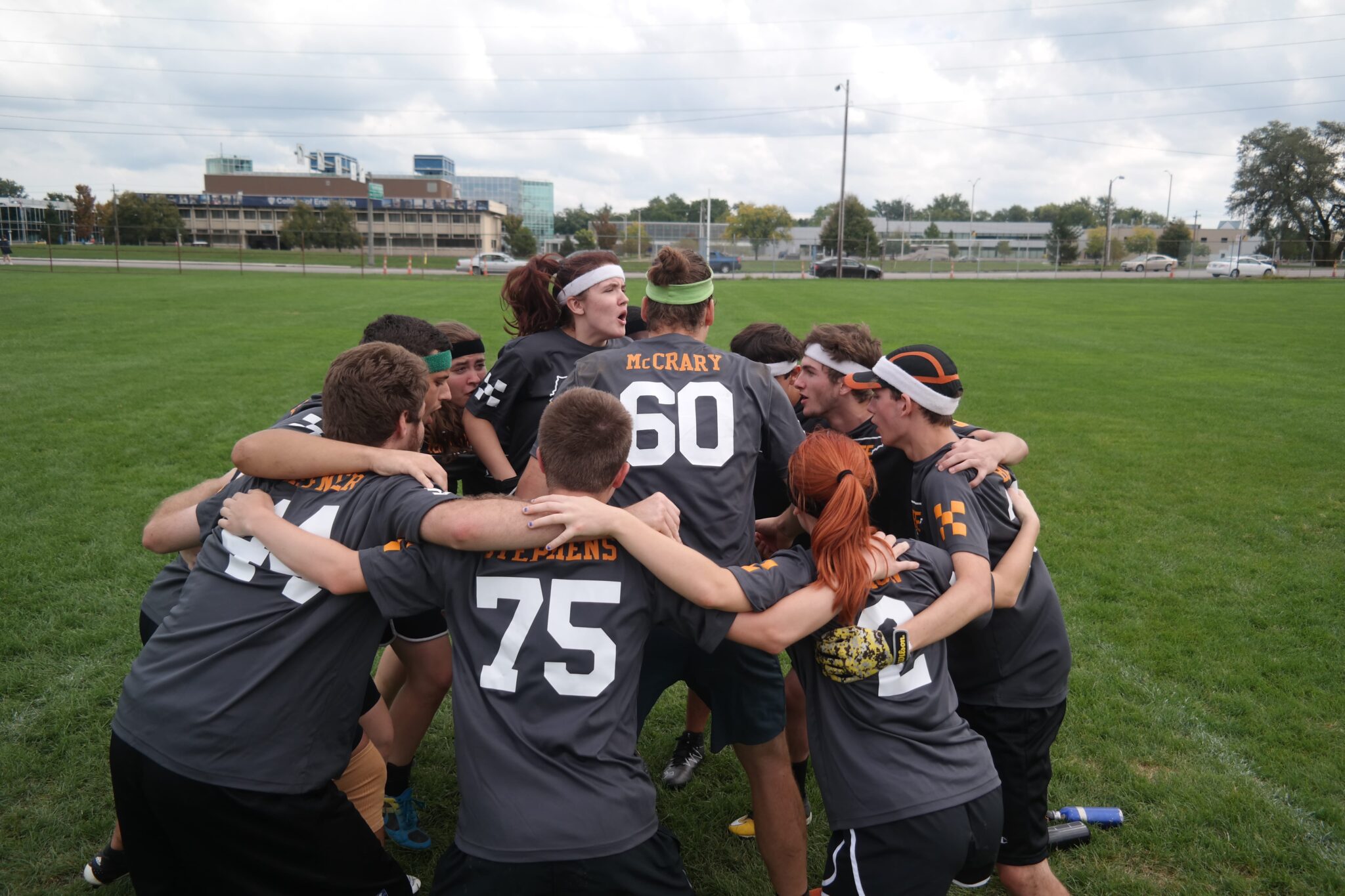Club Week: UT Quidditch club thriving in first year as official sports club
Knoxville isn’t much of a Hogwarts, but there’s plenty of magic surrounding the Quidditch club.

Tennessee's Quidditch club huddles before a match at the King of the North Tournament in Toledo, Ohio, in October 2016.
The University of Tennessee is sporting a section of “Harry Potter” that doesn’t rely on a sorting hat to find new members.
The university’s quidditch team, now in its fourth year, has a little more magic to spread after being added as an official sports club before the 2016-17 school year.
The move opened up funding opportunities that the team had never seen before.
“Now we have more expensive dues, but we don’t have to pay for things out of pocket,” sophomore Haley Snider, treasurer of the club, said.
Things weren’t always like that.
In the three years before the club’s move to an official sports club, members bought the required equipment on their own dimes. Each quidditch club is required to have its own set of hoops, “brooms,” dodgeballs and volleyballs for games.
The official sport is mandated by US Quidditch (USQ). For fans of the “Harry Potter” novels and movie series, most of the rules mirror the story. Each match features two teams that face off on a field in a most-points-win affair. Individual teams can have as many as 21 players on a roster, but only six on the field to start matches. Those six include three chasers, two beaters and a keeper. A seventh member, the seeker, comes onto the field in the 18th minute of the match to chase the snitch.
Chasers have one objective: score. The three chasers, who wear white headbands during matches, pass a quaffle (volleyball) among themselves down the field while attempting to throw it through their opponent’s hoops. Doing so results in 10 points.
The two beaters, who wear black headbands, aim to disrupt opposing play by hurling bludgers (dodgeballs) at opponents. If a throw connects, the player hit with the bludger has to run back to his or her own team’s rings and touch one before being allowed back into play.
The keeper wears green and acts like a goalie in soccer. The keeper’s job is to guard the team’s hoops from chasers trying to score.
The lone seeker for each team wears yellow. Like the book and movie series, each team’s seeker chases a released snitch. When caught, the game ends. In the USQ version of the sport, capturing the golden prize is worth 30 points. Tactics are a bit different from the stories, however. In the 18th minute of matches, a neutral athlete wearing yellow is released into the playing field. This person has a a ball inside a sock that’s attached to his or her waistband. When one seeker grabs the ball and sock and has clean possession, that team is awarded 30 points and the game ends.
Players must have a “broom” between their legs at all times during matches. Most younger clubs and clubs without bigger budgets use PVC pipes or some variations of them.
Simple, right?
“Some people think it’s a whole bunch of nerds just running around doing nerdy things,” Caleb Heffner, the club’s coach and keeper, said. “We’re kind of doing that, but it’s also a sport … it’s a mixture of so many different kinds of sports that it melds every skill into one.”
Club president Darcy Phinney echoes her coach’s sentiments.
“Some people think we’re a bunch of nerds running around on a field with capes,” Phinney said. “It was like that in the beginning, but now, I get bruises every practice. We’re a full-contact sport.”
The physical nature of the unique sport can be intimidating for a co-ed game. To combat this, USQ institues the 9 and 3/4 rule, otherwise known as the max-four rule. The rule states that no team can have more than four players that identify as the same gender on the same time. When the seeker enters play in the 18-minute mark, that number increases to five.
Heffner and Phinney both agree that some of the best players on the team are girls.
“I think they keep up with the guys, and there’s nothing there separating us from being a good team other than the way we all play together,” Phinney said. “(Quidditch) encourages people to do their best no matter who they are, and that’s really awesome to be a part of.”
That diverse flow translated to results this year when the team got its first-ever win at regionals. This year, 17 teams from the south competed in Columbia, South Carolina, with a chance to play their way into nationals in April. Heffner said his preseason goal was to win the club’s first game at regionals.
Now in its 10th year as an official sport, quidditch’s popularity is growing quickly. The South is still one of the most underdeveloped areas for the sport, says Heffner, but that more people become aware of it each year. Community teams and college teams similar to Tennessee’s compete in monthly tournaments all across the country.
Phinney says the club has been as far as Toledo, Ohio this season, and can continue to travel as long as fundraising goes well and people continue to recognize the sport. One of the biggest factors people overlook, she says, is how inclusive the sport is.
“One of the things people say to me is ‘Oh, I’m not athletic,'” Phinney said. “I tell them that I wasn’t athletic until I came to quidditch. I’ve learned how to play to my strengths as a single player and for the betterment of the team.”
Going forward, both Phinney and Heffner say they just want to see the sport’s popularity spread. Phinney says it has good potential to catch on among all ages — Tennessee’s team even hosted a young children’s book club to come out and participate in an event dubbed “Kidditch.”
“I wish people would recognize that (quidditch) is a thing we do,” Heffner said. “I hope we can do that by being out there more and showing that it’s a real sport by trying to win tournaments.”
Tennessee hosts a tournament, Rocky Top Rumble, on March 4 at the UT RecSports Complex. The team is preparing with practices three nights a week on Fulton Bottoms Rugby Field, a privilege it got this year as an official sports club.
As for Heffner, he only has one wish for the tournament.
“Hopefully people do come by and see that its actually a sport,” Heffner said.
No sorting hat selection required.
Edited by McKenzie Manning
Featured image by Cagle
Nathan is a junior at the University of Tennessee-Knoxville. He spends most of his free time eating meaningless foods and watching sports. If you wish to contact Nathan, you can email him at wodom3@vols.utk.edu or find him on Twitter, @NathanOdom11.



